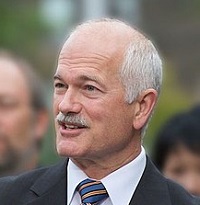
Nearly five years ago, a Canadian election turned on Stephen Harper’s promise that his Conservatives would bring accountability and transparency back to Canadian democracy. Parliament would once again be respected, and the needs of Canadians put ahead of entrenched interests and the old ways.
So much for that.
Even his commitment to level the political playing field by assigning fixed election dates — signed into law with much earnest chest-beating — was cast off for partisan advantage. Inside players, lobbyists and cynical manoeuvring to disempower the House of Commons dominates our government more than ever. Parliamentary debate continues to degenerate, as if to underline its growing irrelevance to results on the ground.
Is it any wonder more Canadians are turning off? More and more are staying home on election day in a mass condemnation of our democratic institutions: ”A pox on all their houses!”
Through the 1960s, 1970s and 1980s, 75 percent of us regularly participated in federal elections. By 2008, voter turnout had collapsed to 59 percent, an all-time low. If turnout rates were akin to blood pressure readings, our democracy would be headed to the ER. Among those who do troop dutifully to the polls, the two parties that have alternated in government since Confederation can now muster the support of barely half between them.
Canadians are clearly not happy with the traditional offerings.
Is today’s sorry state of affairs all Stephen Harper’s fault?
No. His government is certainly accelerating a trend. But this trend is founded on ideology that’s limited neither to Conservatives nor to Canada. Its essence argues that citizens are best off left to our own devices. Therefore, this ideology holds, the only things we can and should do together through our federal government are to stop bad people through our justice system, immigration policies and a robust defence infrastructure.
So much for working together to achieve better health care and education, basic social equality, a viable environment, livable communities or a robust economy. Not to mention doing our part to create a more peaceful and sustainable world. Ottawa is increasingly gripped by a belief that we Canadians cannot and should not do substantial things together through our government.
As a city councillor in Toronto, I saw the first dramatic and tangible evidence of this thinking taking hold in Canada with the 1995 federal budget. That budget launched cascading cuts to many of the programs and policies that had been built by the postwar generation. That left cities like mine scrambling to cobble together social infrastructure to protect the most vulnerable. Often we found ourselves having to rob Peter to pay Paul — deferring investment in roads and sewers to fund child care subsidies or social housing.
Even though that deficit was gone in three years, reckless cuts continued for ten. And these cuts drove a generational wedge between the federal government and programs that defined us as Canadians — health care, post-secondary education, inequality-reducing social transfers, family-protecting employment insurance, affordable housing.
Ottawa’s punishing cuts were wrapped up in the seductive notion of wrestling a budget deficit to the ground. For the old-line parties, “deficit fighting” became the big new pan-Canadian project. But even though that deficit was gone in three years, reckless cuts continued for ten. And these cuts drove a generational wedge between the federal government and programs that defined us as Canadians — health care, post-secondary education, inequality-reducing social transfers, family-protecting employment insurance, affordable housing.
Those cuts set Canada on a course for needless human misery and social inequality. A second predictable result has been massive surpluses of tax revenues and EI premiums. But instead of using those funds to rethink and reinvest, both old-line parties have given away most of that capacity as tax cuts, mostly to those with little need for them.
Now we have a federal government that does less for Canadians. No wonder Canadians care less about their federal government.
When Canadians criticize federal politics, many cite incivility among politicians themselves. Even in my seven years on the Hill, I’ve witnessed a decline, especially in Question Period. There’s too much adolescent namecalling, especially from the government side. Too many ministers duck questions, day after day, by returning fire with sputtering aggression.
When the remarkable Ed Broadbent retired for a second time in 2005, he shared these pointed words with colleagues in the House:
If I were a teacher, I would not want to bring high-school students into Question Period any longer. There is a difference between personal remarks based on animosity and vigorous debate reflecting big differences of judgment…However we may differ, we are all human and we all have the right to have our inner dignity respected, especially in debate in the House.
(Hansard, May 5, 2005)
At times, incivility even blends into outright harassment, even misogyny. When Belinda Stronach crossed the floor from the Conservatives in 2005, onetime colleagues called her a “dipstick” and a “whore.” Alexa McDonough, while serving as my foreign affairs critic, was told to “stick to her knitting” by the man who is now Canada’s defence minister. At its worst, posturing in Ottawa seems almost designed to turn off voters, as if to telegraph, “There’s nothing worthy of your attention here.”
I do believe that fading decorum is linked to a deeper shift that is taking place in Ottawa. This is a structural shift in how power is exercised in Ottawa — a shift that is increasingly undermining Parliament as the seat of our democracy.
“It’s about who you know in the PMO.” Fifteen years after Paul Martin used that line to poke Jean Chrétien, power continues to concentrate in the Prime Minister’s Office. Today’s PMO is an integrated policy and promotions shop that treats the best-connected lobbyists as privileged clients. That leaves our elected House of Commons less empowered to represent voters and keep prime ministerial power in check.
Stephen Harper has gone further than any past prime minister to undermine Parliament’s constitutional supremacy. He has ignored duly adopted motions of the House. He has ignored legal orders to hand over documents to members for scrutiny. He has instructed political staff to ignore summonses to testify at committee. He scuttled the Public Appointments Commission when Parliament vetoed his hand-picked chair. He even prorogued Parliament for partisan ends, once to save his government from defeat, then again to sidestep legitimate questions about his government’s knowledge of Afghan prisoner transfers.
My assessment: As MPs sense that their Parliament is being supplanted by the PMO, gravitas tends to fade and posturing tends to thrive. Some government backbenchers seem to approach the House as a self-contained political game, as opposed to a forum for getting practical results for Canadians back home.
I’ll be plain: I don’t believe that incivility alone is driving Canadians en masse away for Ottawa. When I explore this more deeply with Canadians on my travels, I usually find that they are experiencing House antics as symbolic of a deeper malaise — of a democracy that’s losing its connection with ordinary citizens.
While voter alienation has been simmering for some time, many people believe it’s coming to a head under Stephen Harper’s government. I sense a public mood that bounces between disinterest, perplexity and despair. Democracy should not have to feel this way.
Canada’s first-past-the-post voting system has long fuelled voter disengagement. When a party can win all of the power with a minority of votes, people start to wonder if their votes really count. But now look: Even a minority of seats seems to be giving one party 100 percent of the power — executive and legislative too. Something’s wrong in Ottawa, and Canadians feel it.
Beneath all the posturing, we’ve had a stable but unacknowledged governing coalition in Ottawa since 2006. As I write, the opposition Liberals have backed the Harper government through 108 confidence votes. They have done so without securing any concessions on behalf of their voters. For a brief stretch last year, Michael Ignatieff withdrew his blank cheque, announcing that Stephen Harper’s “time was up.” I took the opportunity to negotiate with the government; Prime Minister Harper earned my caucus’s vote to deliver a $1-billion employment insurance package for workers who’d lost jobs in the recession. But I lost the hammer when Mr. p went back to supporting Mr. Harper — unconditionally, once again.
After four and a half years of this pseudo-majority government, everyday life is more expensive, and the best-connected insiders are still getting all the breaks. The PM is more empowered than checked by his Official Opposition. He chose the darkest hours of the BP oil spill, for heaven’s sake, to weaken environmental assessment for offshore energy projects in Canada. Instead of pragmatic investments in Canadians in this time of great need, he has delivered billions more in tax breaks for banks and oil companies.
By rights, this shouldn’t be possible. Minority Parliaments should be venues for interplay and negotiation. That’s how past minorities have functioned. That’s how New Democrats helped bring in medicare and public pensions. But Stephen Harper has instead been free to implement an agenda that 62 percent of voters rejected in the last election.
This is not what democracy is supposed to look like.
This current Parliament underlines deep reasons why many people are losing faith in politics. Citizens are in the midst of a generation-long process of being taught that their Canadian government can’t and shouldn’t do much for them. Today’s do-nothing coalition of old-line parties is a symbolic embodiment of that par excellence.
What’s being undermined is the very notion that we can tackle big issues through our collective capacities as Canadians. That punishing 1995 budget did not simply cut vital funding. It disassembled the Canada Assistance Plan, which had encoded the idea that Ottawa played a vital role in achieving social equality. It disassembled the notion that Ottawa’s job includes keeping education and training leading-edge and accessible, as part of building our country’s future. It disassembled the idea that Ottawa has a leadership role to play in modernizing public medicare.
The ensuing 15 years have done nothing to change Canada’s course. From time to time, we see one-off contracts with provinces when a crisis hits — a little homelessness funding in response to a tragedy, or one-off child care deals with each province that can be cancelled at a whim. But the federal government has all but stopped advocating major pan-Canadian solutions on big issues that affect people’s lives.
This shift has been promoted both by ideologues and by lobbyists and the corporate clients they represent. Now those same companies are coming in and backfilling the lost capacity, for profit. We see an ever-expanding corporate presence on our college and university campuses. We see tremendous force applied to open up health care services for profit. We’re seeing a proliferation of for-profit, big-box child care operations. We’ve seen an increasingly privatized transportation system, with the sell-off of Air Canada and Canadian National.
Canada’s first-past-the-post voting system has long fuelled voter disengagement. When a party can win all of the power with a minority of votes, people start to wonder if their votes really count.
Ottawa has withdrawn from people’s everyday lives to the point where many no longer see a role for Ottawa as the embodiment of our collective capacities. When people are told over and over that their government really shouldn’t be involved in things, they start to lost interest — “Why bother?” It’s an ideological shift shared by oldline parties and plainclothes ideologues, and battered home daily through media outlets that are increasingly concentrated in the hands of a corporate elite that shares the same perspective.
One of the most insidious of the ideologues’ tactics is to demean those who stand for public office. Right-wing columnists have made careers out of slamming politicians, whipping every error into an absolute frenzy of disdain, inviting citizens to wish poxes on all political houses. It’s working. In an Angus Reid poll this April, barely one-quarter of Canadians could bring themselves to say they respect politicians — down from two-thirds in 1994.
These results are tragic. When citizens withdraw from their democracy, powerful lobbyists and ideologues rush into the vacuum, in greater numbers, with even more influence.
And so goes the vicious cycle.
It’s time to change things up.
Let me share something from the floor of the House of Commons: It’s not all ugliness. Much of Parliament’s work takes place outside the theatrics of Question Period. In routine debate and committee proceedings, I still witness thoughtfulness, cooperation and compromise. Useful legislation and effective regulations are developed and passed, sometimes with unanimous support. Canadians deserve to hear about this work more often.
I am privileged to work with good-willed Members of Parliament on all sides of the House. These are committed public servants who sacrifice much to stand for elected office. We can disagree profoundly on policy but share a commitment to building a better country. It should give citizens hope to know that many people are in this profession for the right reasons.
Something else that fuels my hope is the modern rebirth of citizen journalism, as a healthy balance to messages that often dominate corporate media. Together, especially through blogs and social media, engaged Canadians are sharing diversely constructive perspectives on politics. It’s a refreshing counterpoint to the “pox on all their houses” defeatism that only sours citizens on their own democracy.
I also take heart in citizen-driven efforts to renew our democracy. In the past five years alone, we’ve seen major campaigns to bring proportional representation to British Columbia, Ontario and Prince Edward Island. While they didn’t succeed this time, they proved that grassroots passion for voting reform is alive and well. That same passion bloomed in the public response to Stephen Harper’s last prorogation. Countless Canadians contacted New Democrat MPs — calling, writing, stopping us on the street. Hundreds of thousands voiced their opposition online or attended protests in communities from coast to coast to coast. I was struck by the number of protesters who told me they’d long ago given up on politics, but felt newly motivated to reclaim their democracy.
We can disagree profoundly on policy but share a commitment to building a better country. It should give citizens hope to know that many people are in this profession for the right reasons.
Turning things around in Ottawa won’t be easy. But New Democrats are ready to work with citizens to build on the energy and hope that we see emerging. And I believe we can do it, one practical step at a time.
This spring, Parliament passed an NDP motion to limit the prime minister’s prorogation powers. We have put forward practical proposals to raise the bar of decorum in the House. We continue to argue for the abolition of the Senate — because we believe it is an undemocratic, unaccountable and unnecessary check on the people’s House. New Democrats are consistent champions of electoral reform to make every citizen’s vote count in every election.
By re-empowering the people’s elected House, these reforms can help to re-engage citizens in their democracy. Taken together, they form a structure to build on. But what we need most urgently in this country is a refreshed role for the federal government: A federal government that embodies our collective capacities to look after each other. The kind of government that empowered us to build great things together — our national railroad, a national broadcaster, a public health care system that was once the envy of the world.
Emerging from recession, Canadians face historic challenges and opportunities. Middle-class living standards are eroding as the gulf between the rich and the rest widens. A quarter of a million seniors are living in poverty, and one in three Canadians will soon be retiring with no savings. Health care services need an upgrade to accommodate our aging population and modern medicine. Families are grappling with chronic shortages of child care spaces and affordable housing units. The world is waiting for Canada to do its part to head off climate catastrophe, and we have deep unrealized potential to remake this country as a green technology leader.
These are the kinds of challenges and opportunities that we can tackle best by working together. That’s why New Democrats have introduced legislation is virtually all of these areas — painstakingly developed over the last several years. I look forward to a Canada where citizens can expect clear visions from all party leaders for where we can take this country — with a commitment to move forward one practical step at a time.
Minority Parliaments will be routine in this country for the foreseeable future. This should be an exciting and productive era for Canadians, but only if Parliament starts getting it right. Opposition parties have an indispensable role to play in minority situations — by representing their priorities in the crucible of the House with vigour and clarity. That process will always blend force, negotiation and compromise. But when opposition parties fail to oppose, they kill their own leverage, leaving governments free to run roughshod. We have seen too much of that in our current Parliament, insulting voters and calling into question the role of the Prime Minister’s junior partner.
I believe principled compromise and cooperation need to deliver results. Last year, we secured an EI extension for long-tenured workers. In 2005, I worked with Prime Minister Martin to rewrite a budget to redirect needless corporate tax cuts into priorities like affordable housing, training, public transit and energy efficiency. Looking forward, we will continue to reach out to other parties in Parliament, working with those who will help move our agenda forward.
New Democrats will always be clear about whose side we’re on. We aim to present a pan-Canadian vision that voters can engage with and hold us accountable to. My bottom line will always be the same: getting results for voters and the priorities they asked us to fight for.
Let’s turn a vicious cycle into a healthy cycle. Canadians deserve to see their government making a positive difference in their lives. When that happens, we’ll see more Canadians not just taking an interest in the federal government, but taking back ownership of their government — once again making it a tool to build a better world together.
Photo: Shutterstock









